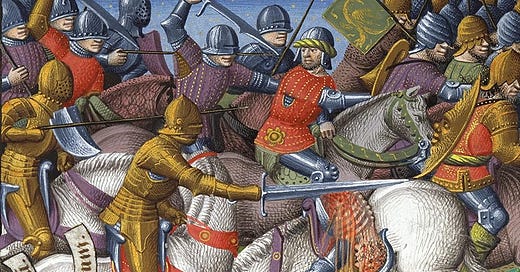If you are looking for the beginning of the study for The Song of Roland then you can go HERE for a brief introduction. At the bottom of the introduction you will find the links to each section of the study guide as it becomes available. If you would like to see the growing list of book studies available for free on this site you can go HERE. Enjoy!
Virtues/Vices/Great Ideas: (Find them in the Text)
Love, Friendship, Despair, Cowardice
Grammar Questions: (The Information of the Text)
At the beginning of this reading, how many of the French remain? Name them.
What is Walter’s condition as he comes looking for Roland?
What did Archbishop Turpin do once his horse was killed?
What did the Paynims hear which left them with “no lust to laugh”?
What did Roland do when he realized that Turpin had no horse to ride upon?
How many wounds brought down Roland’s horse?
After the paynims retreat what is the first thing that he does?
What work did Turpin request Roland to do concerning their friends?
What was Turpin trying to do when he died?
What unconventional weapon did Roland use to kill the Paynim who tried to rob him in his swoon?
What did Roland attempt to do with his sword?
Where did Roland’s sword come from and what made it so special?
What is the last thing Roland does before he dies?
Logic Questions: (Interpreting, Comparing/Contrasting, Reasoning)
Reread Laisse 65. Where has Walter been and why is only now joining up with Roland?
Why did the Emperor “bid every trumpet play”?
Why did the Paynims want to make sure Roland died before Carlon (Charlemayn) arrived?
Why did the Paynims run away “in wrath and grief” while Roland was still alive?
Why did Roland try to break his own sword?
Why was it important to Roland to make sure he “turned his head to where the Paynims are” before he died?
What is the significance of the fact that “Angels from Heaven” descended to Roland’s side after his prayer?
Rhetoric Questions: (The Analysis of Ideas in the Text)
Roland gathers up the bodies of his slain friends and brings them to Archbishop Turpin who “lifts his hand and gives them benison.” What value is there in pronouncing blessings over the bodies of those who have died? Is it a foolish and pointless exercise or does it confer some real good? Explain your answer carefully.
If you were to critically evaluate the perspective of the Christian religion displayed in this present reading, what would you commend and what would criticize? Make sure you explain why you think these various elements are commendable or deplorable.
Theological Analysis: (Sola Scriptura)
Read James 5:15-16. What does this passage teach concerning confession of sin and forgiveness? How does it relate to our current reading?
Read 1 John 1:9. What does this passage teach and how do we see a good example of this in our current reading?
Read Luke 23:39-43. What does this passage teach concerning death for those of faith? How does it relate to our current reading?



